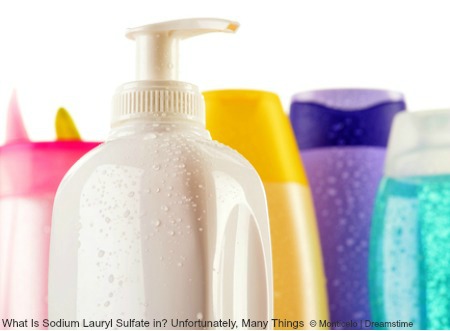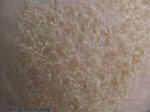What Is Sodium Lauryl Sulfate, And How Can It Affect Eczema
So exactly what is sodium lauryl sulfate?
Also known as SLS, it is used in a range of products because of its properties.
- Detergent – used as a cleaner
- Surfactant – creates bubbles/foam

It is used in many different products. As well as in industrial and cleaning materials, it is used in some toiletries.
- body wash
- shampoo
- soap
- toothpaste
There have been many studies that have concluded that SLS can be damaging to the skin.
In people with eczema, it has been reported that it can further damage the skin. It can also be an irritant. This can make your eczema worse, causing dryness and redness.
What is Sodium Lauryl Sulfate's Origin
The origin of SLS is the humble coconut. Some companies would like you to believe that because of this, it is a more natural product. This is not the case.
The base material used from the coconut is lauryl alcohol. The lauryl alcohol then goes through several chemical processes. It is also mixed with other chemicals. This makes it nothing like the original base material taken from the coconut.
What Is Sodium Lauryl Sulfate Used For?
SLS is used in products as a detergent and foaming agent.
It seems that it is used in products that require foam and bubbles, for example soap. So basically it used to create a better looking product. People may assume that more bubbles means it is doing a better job.
As the concerns of SLS have become more well-known, some companies have cut down on its usage.
There are other less irritating and milder detergents and surfactants being used. These do just as good a job at cleaning.
If you want to avoid SLS, check the label of products. When checking, look out other names for it.
These include
- Lauryl alcohol
- n-lauryl sulfate sodium
- Sodium lauryl sulfate
- Sodium dodecyl sulfate
- Sodium monolauryl sulfate
- Sodium dodecane sulfate
Concerns of Sodium Lauryl Sulfate
For eczema sufferers, the biggest concern is skin irritation. It can dry out your skin, making it itchier. Starting the itch-scratch cycle. Leading to skin damage, inflammation and a possible infection.
There are other health concerns that can affect anyone
- skin and eye irritation
- irritation to respiratory system, if inhaled
- toxic, if swallowed
Even after all these concerns, it is still said to be safe to use in small doses.
If you have any worries about it, use toiletries that don’t contain it. You can find many products, including soap, shampoo and toothpaste, without sodium lauryl sulfate. Natural products are a good place to start.
Aqueous Cream
I first heard about SLS when I was looking into aqueous cream. My doctor had recommended using it alongside a topical steroid to treat and manage my eczema.
When I first started using it there were no side effects. Then I started noticing that after I applied it, my skin would start to feel itchy. So I decided to look into it.
The main point raised was that aqueous cream contains SLS. Then that SLS can have a negative effect on your skin. I stopped using it directly on my skin as a moisturiser.
I do still use it as a wash, or a shaving cream. Or in anyway that means that it isn't in contact with my skin for a prolonged time, and gets rinsed off.
I decided I needed to find an alternative. So now using Epiderm, which is working just fine at the moment. No irritation.
Not everyone has an issue with irritation from Sodium lauryl sulfate. Though as I found, there wasn’t any immediate irritation.
I have concluded that perhaps after using a product containing it, directly on my skin, for a period of time my skin was further damaged. This may be why the irritation suddenly started.
It is recommended that if your child has eczema that you should avoid using anything containing SLS. Though thankfully there are baby products that do not contain it.
Return from What is Sodium Lauryl Sulfate to Triggers of Eczema
Return from What is Sodium Lauryl Sulfate to What is Eczema
Search What Is Eczema?
Advertising on What Is Eczema?
We are a participant in the Amazon Services LLC Associates Program, an affiliate program which allows sites to earn fees by advertising and linking to amazon.com. If you make a purchase through a link on this page, I may receive a small commission, at no extra cost to you. Many thanks
